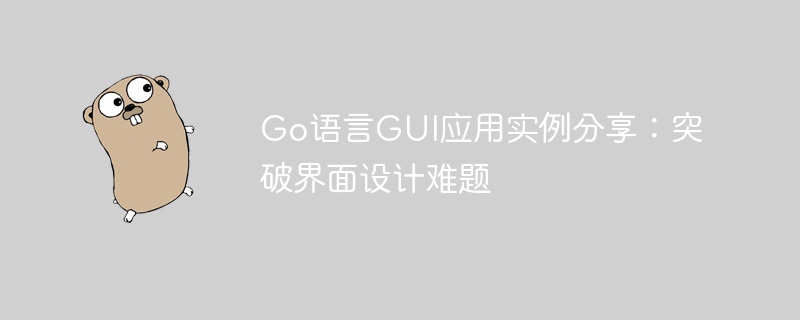Home >Backend Development >Golang >Sharing of Go language GUI application examples: Breaking through interface design problems
Sharing of Go language GUI application examples: Breaking through interface design problems
- PHPzOriginal
- 2024-03-25 08:09:03532browse

As people's requirements for software interface design continue to increase, how to develop applications with modern GUI interfaces in the Go language has become a challenge. This article will share an example of a Go language GUI application and provide specific code examples to help readers break through the difficulties of interface design.
Introduction
Although the Go language is famous for its simplicity and efficiency, its ecology in GUI development is relatively weak. However, with the help of some excellent GUI libraries, such as fyne, gotk3, etc., we can still develop attractive and practical GUI applications. In this article, we will take the fyne library as an example to show how to use the Go language to develop a simple GUI application.
Example description
We will develop a simple to-do list application, including a text input box for entering to-do list content, and an "Add" button for adding to-do list items. And a list showing the added to-do items. In this application, users can enter to-do items and add them to the list, and click on the added to-do items to mark or delete them.
Code sample
The following is a code sample for this simple to-do application:
package main
import (
"fyne.io/fyne/v2/app"
"fyne.io/fyne/v2/container"
"fyne.io/fyne/v2/widget"
)
func main() {
myApp := app.New()
myWindow := myApp.NewWindow("Todo List")
input := widget.NewEntry()
list := widget.NewList(
func() int {
return len(todos)
},
func() fyne.CanvasObject {
return widget.NewLabel("")
},
func(i widget.ListItemID, obj fyne.CanvasObject) {
obj.(*widget.Label).SetText(todos[i])
},
)
addBtn := widget.NewButton("Add", func() {
todos = append(todos, input.Text)
list.Refresh()
})
content := container.NewVBox(input, addBtn, list)
myWindow.SetContent(content)
myWindow.ShowAndRun()
}
var todos []stringSample running effect
By running the above code sample, we You can see a simple to-do application interface. Users can enter to-do content in the text input box and click the "Add" button to add it to the list. The added to-do items will be displayed in the list in real time, and users can modify or delete them at any time.
Summary
Through this simple example, we can see that it is not difficult to develop GUI applications using Go language. With the help of existing GUI libraries and tools, we can quickly develop applications with modern interface designs. I hope that readers can master the basic methods of developing GUI applications in the Go language through the examples in this article, thereby adding more possibilities to their own projects.
The above is the detailed content of Sharing of Go language GUI application examples: Breaking through interface design problems. For more information, please follow other related articles on the PHP Chinese website!

